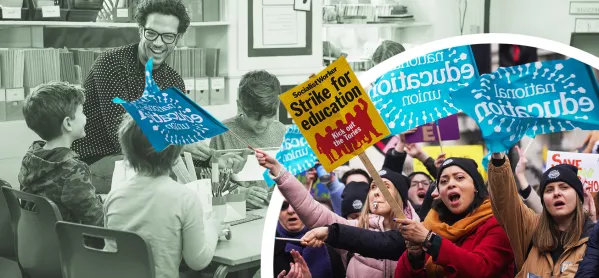DfE strike plan ‘a hostile attack’ on teachers’ rights

The education secretary has been accused of launching an attack on teachers’ “basic democratic rights” with a plan to bring in minimum service levels in schools to curb strike disruption.
Gillian Keegan has written to unions today warning that the government will introduce minimum service levels in schools if voluntary agreements on staffing levels during strikes cannot be reached.
The Department for Education has said the minimum service levels (MSLs) “will put in place protections for children, young people and parents to ensure education can continue during any future strike action”.
But unions have described the move as an attack on teachers’ rights and said it is “unimaginable” that a voluntary agreement will be reached.
- Teacher strikes: Ministers want voluntary minimum service level agreements in schools
- Labour: Starmer says he would repeal new strike laws
- Industrial action: Teaching union launches action short of a strike
Ms Keegan has written to union leaders inviting them to discuss proposals on a voluntary basis in the first instance.
The DfE said that the letter “is clear that should a voluntary agreement not be reached, the government is committed to using powers granted through the Strikes (Minimum Service Levels) Act that was introduced earlier this year.”
DfE strike plan ‘undemocratic’
Paul Whiteman, general secretary of the NAHT school leaders’ union, said: “This is nothing short of an overtly hostile act from the government and an attack on the basic democratic freedoms of school leaders and teachers.
“At a time when the government should be building bridges with the profession, the timing of this couldn’t be worse. Not only are the government’s proposals for minimum service levels fundamentally undemocratic, they are utterly unworkable in a school setting.”
Daniel Kebede, general secretary of the NEU teaching union, said the union does not acknowledge the validity of MSLs, “given their impact on the fundamental right to strike”.
He added: “The government, led by a prime minister not elected by the public and who has just had two historic by-election losses, has no democratic mandate to implement such an attack on our democratic freedoms.
“The government would get further in minimising industrial action and disruption to schools if it engaged with unions on the issues that give rise to ballots.”
Geoff Barton, general secretary of the Association of School and College Leaders, said: “At a time when there are major staff shortages in education, schools have been given incorrect budget information and buildings are literally crumbling, it is hugely disappointing that the secretary of state has decided to pick a fight with those who represent the profession. This is nothing more than an attempt to distract from her department’s own shortcomings.
“We understand the secretary of state is seeking voluntary agreement to minimum service levels in the first instance, but it is unimaginable that there will be any agreement over legislation that involves removing the basic rights of employees.”
Meanwhile, Patrick Roach, general secretary of the NASUWT teaching union, whose members are currently engaged in industrial action over workload and working hours, said the move was a ”blatant attempt to distract from the crisis engulfing our schools and colleges on this government’s watch”.
“At a time of a worsening teacher recruitment and retention crisis, when school buildings are collapsing and riddled with asbestos, and when pupils with special educational needs are unable to access the specialist support they need, the government is continuing to fail our children and young people,” he added.
The government announcement follows a national teacher strike launched by the NEU earlier this year over a pay dispute, which has now been resolved.
The DfE has said that pushing ahead with MSLs would involve launching a consultation on a range of models for the service levels in education, for parents, teachers and other stakeholders to give their views on.
Ms Keegan said: “Last year’s school strikes were some of the most disruptive on record for children and their parents. We cannot afford a repeat of that disruption - particularly as schools and teachers continue to work so hard to help children recover from the pandemic.
“I am asking the teaching unions to engage with us and agree to put children and young people’s education first - and above and beyond any dispute.”
You need a Tes subscription to read this article
Subscribe now to read this article and get other subscriber-only content:
- Unlimited access to all Tes magazine content
- Exclusive subscriber-only stories
- Award-winning email newsletters
Already a subscriber? Log in
You need a subscription to read this article
Subscribe now to read this article and get other subscriber-only content, including:
- Unlimited access to all Tes magazine content
- Exclusive subscriber-only stories
- Award-winning email newsletters
topics in this article



